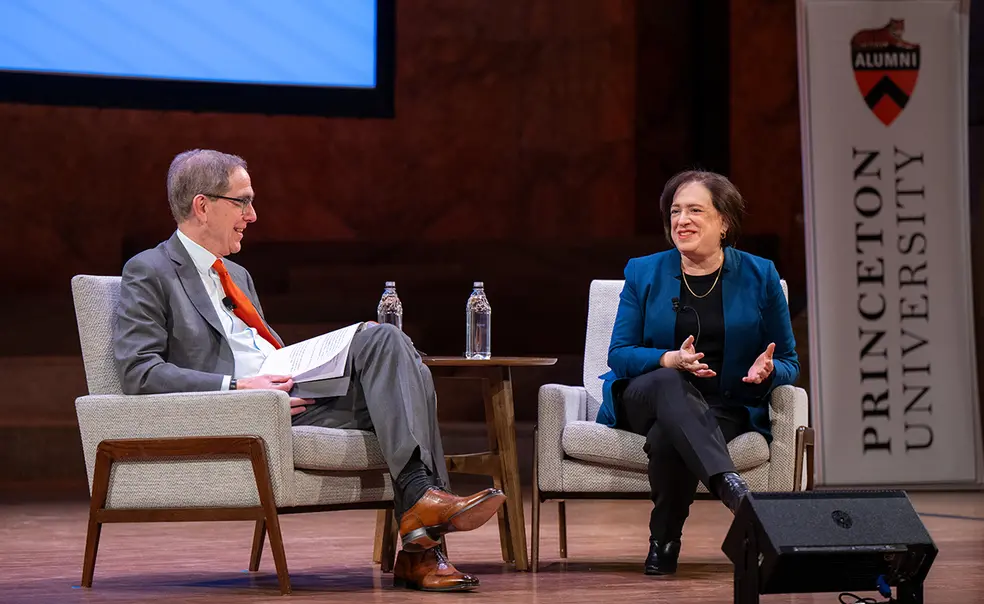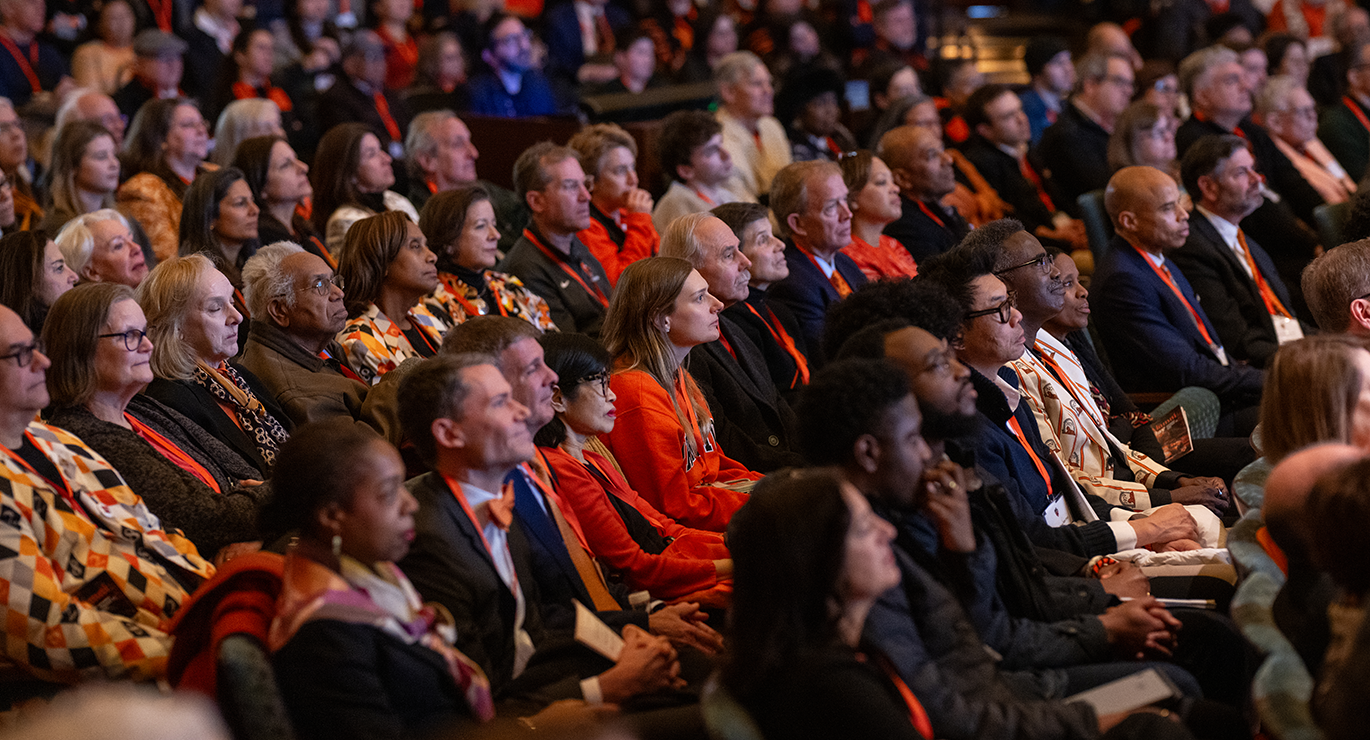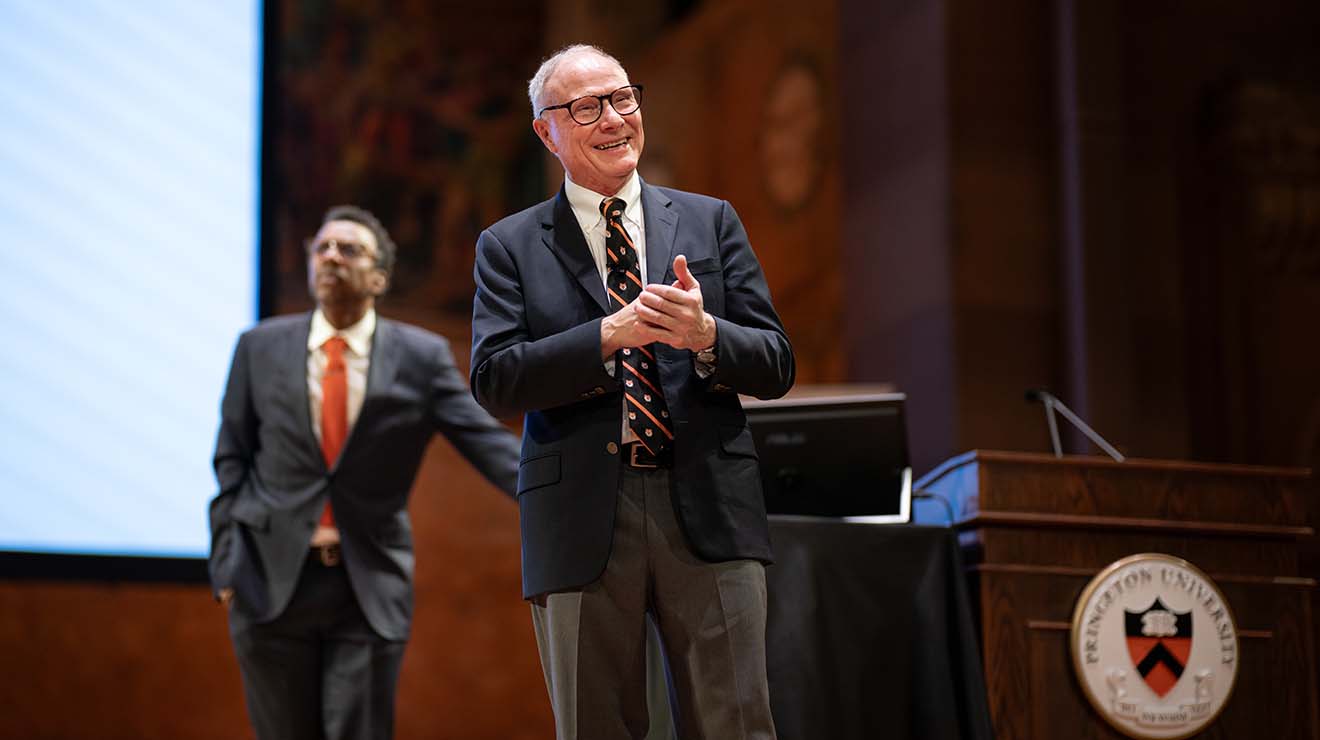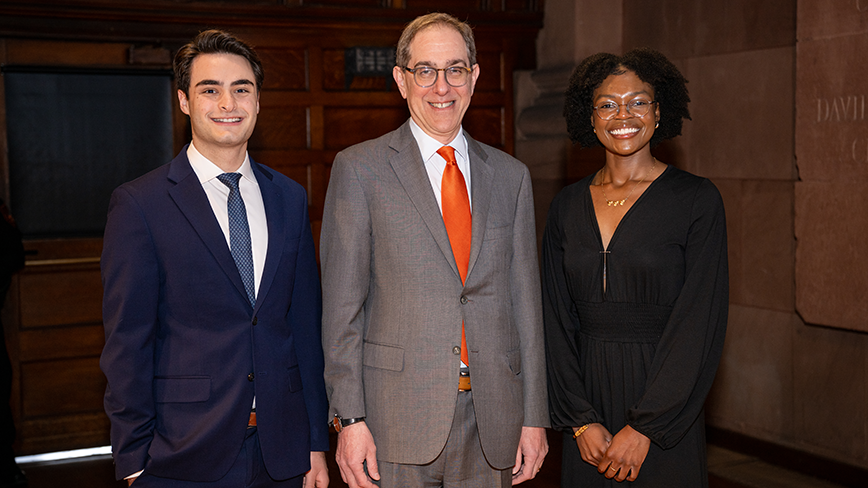Justice Elena Kagan ’81, Nobel Laureate David Card *83 Honored at Alumni Day
Attendance sets a new record as Kagan speaks about her work on the Supreme Court
Supreme Court Justice Elena Kagan ’81 told a Princeton Alumni Day audience that based on what she has witnessed as a justice and in her earlier role as solicitor general in the Department of Justice, the preparation that goes into the work of the nation’s highest court is “incredibly impressive.”
“Now that doesn’t mean that everybody’s supposed to be like, ‘Hey, hunky-dory,’” Kagan said. “In the end, the results matter, and people are absolutely entitled to make judgments about the court based on the results that the court is reaching and the reasons that the court is giving for those results. And people are absolutely entitled to have opinions and to make judgments about whether the court is doing its job properly.”
Kagan, on campus Feb. 22 to receive the Woodrow Wilson Award, joined President Christopher Eisgruber ’83 for a thoughtful and sometimes humorous conversation at Richardson Auditorium. She reminisced about her days writing for The Daily Princetonian and told stories about clerking for Supreme Court Justice Thurgood Marshall.
Early in the conversation, when Eisgruber asked about how her institutional role limits what she can say in public forums, Kagan deftly rephrased the question: “You want to know how boring I’m going to be today.”
Though Kagan did not speak in detail about issues likely to be discussed by the court this term, she did provide some insight about the process of writing court opinions and why her favorite opinions tend to be dissents. When pressed for an example, she spoke about her dissent in Rucho v. Common Cause (2019), a gerrymandering case that the court’s majority decided it could not resolve.
If representatives can “arrange the voters so that they get to entrench themselves in office,” Kagan said, democracy is not functioning as it should. She argued in the dissent that the court should step in to prevent “extreme gerrymanders.”
Alumni Day 2025 drew about 1,400 attendees, according to the Alumni Association — a record turnout — and began with a remarkable scene outside Alexander Hall: By 8:30 a.m., queues of alumni and guests wrapped around the building. At 8:43, the doors to Richardson Auditorium swung open, and by 9:02, 13 minutes before the program was scheduled to begin, nearly every seat was occupied. (Overflow viewing was set up in McCosh 50.)
Economist David Card *83, a Nobel laureate and this year’s James Madison Medal recipient, was the opening speaker. True to his roots, he called his presentation an “economics lecture,” though it was also a history lesson about Princeton’s influence on labor economics through the work of the International Relations Section (IR Section), which has now produced four Madison Medalists (Card, W. Michael Blumenthal *56, William Bowen *58, and James Heckman *71).
Card said the IR Section has thrived in part because of its leadership — from J. Douglas Brown 1919 *1928 (one of the architects of Social Security) through Orley Ashenfelter *70 (an innovator in empirical research) — and its community of scholars. He offered two takeaways: “First, a great institution with great support and the right people can make a big difference. And secondly, that can be true even in economics, where progress is slow.”
Card also spoke briefly about the labor force studies that helped him earn the Nobel, including one about the effect that the Mariel boatlift of 1980 had on Miami’s labor market and another, written with former Princeton professor Alan Krueger, analyzing the impact of a minimum wage hike in New Jersey. In the latter, Card and Krueger found no reduction in employment but an increase in prices. Subsequent studies have supported those findings. “Luckily for Alan and I, it turns out we got it right the first time,” Card said during a question-and-answer session with the audience.
Alumni Day also celebrated the Class of 2025’s winners of the Pyne Prize, the highest general distinction for undergraduates: Avi Attar, a School of Public and International Affairs major from Newton, Massachusetts; and Jennifer Nwokeji, a molecular biology major from Harrisburg, Pennsylvania.
Attar said he was grateful for “countless opportunities for growth” at Princeton — as president of Undergraduate Student Government, as a leader of Outdoor Action trips, and as a student of public policy and computer science.
“Over the past four years, Princeton has jump-started that growth not only through academics, but also through the challenges, experiences, and people I’ve encountered,” Attar said. “I know the future will bring its own set of obstacles, but thanks to Princeton, I feel better prepared to face what lies ahead.”
Nwokeji spoke about “the dual concepts of fear and hope,” drawing parallels between the story of her Nigerian-born parents, who moved across the world for a better life, and her own journey to Princeton, from a large public high school that had rarely sent graduates to the University.
“When I committed to Princeton, I was truly afraid — afraid that I wouldn’t match my peers academically, afraid that I wouldn’t fit in, and simply afraid that I didn’t fit the image of a typical Princeton student,” she said. “I wholeheartedly credit my family, friends, and mentors for taking that fear and transforming it into hope.”
Four doctoral students were presented with Jacobus Fellowships, which fund the final year of graduate school: Pietro Cibinel (philosophy), Rama Hagos (sociology), Tung Nguyen (applied and computational mathematics), and Zhiyi “Allen” Ren (mechanical and aerospace engineering).
At a luncheon at Jadwin Gym, Princeton University Art Museum director James Steward gave alumni a preview of the museum’s new home, scheduled to open in the fall. After lunch, the program continued at the University Chapel, where the annual Service of Remembrance paid tribute to alumni, faculty, and staff who died in the last year. At a closing reception in Chancellor Green, attendees raised a glass to the Association of Princeton Graduate Alumni, which is celebrating its 75th anniversary this year.















No responses yet